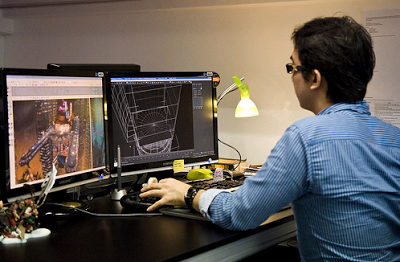Thursday, 10 January 2013
How to Use 3D Modelling Software in Game Design
Do you like this story?

Although today's video and computer
games have become increasingly complex, the software used to design them is
more accessible than ever. To create a believable, engaging game you need to be
able to create memorable characters and an interactive, 3-dimensional
environment. This requires a storyline, original artwork, and the right
technology to get the job done. With the help of 3D modelling software, you can
start putting together these pieces of the puzzle to create your own games.
It's helpful to take a closer look at how to use this complex software to start
putting together your own virtual world on screen.
Getting Started
Before you choose the right software
package to work with, you'll first want to do some basic brainstorming. How
many characters will you need to create? Will they be similar in appearance or
will you need to be able to create a wide range of creatures? Drafting a basic
storyline and having some idea of what type of environments you will be
creating can point you in the right direction towards choosing an animation
program to suit your needs. More complex characters and storylines may require
a professional set of tools like 3D
studio max, while a basic game can be constructed with programs like DX
Studio or 3D Rad. The best programs will offer you a variety of special
effects, templates for creating characters, and adequate tutorials and support
to get started.
Creating Characters
One of the primary features of computer
modelling software is its ability to create characters in a three-dimensional
space onscreen. This allows you to create more lifelike creatures than you
would with traditional animation techniques. Some programs will give you
templates to work with, as well as wireframes that can be built on with
anatomical features and realistic muscular materials. Shading and layering
tools will help bring these features to life.
Special
Effects and 3D Rendering
One of the most complex yet important
aspects of 3D video game production is rendering. This refers to the process of
translating the various mathematical codes that make up a 3D design into a
final 2D image that still looks three-dimensional. For rendering to be
successful, the whole scene has to have the right lighting, colour valuation,
and texture in each pixel of the final 2D image. This can be incredibly
time-consuming without the right 3D
software, which speeds up the process by pre-storing lighting and texture
information for greater accuracy. Many computer programs will automatically
render as you are designing your game, but you may have to follow this step
after your animation designs are complete.
Special effects and tools are also an important part of finalizing your images for the screen. Software toolkits let you work on specific textures, such as hair, fur, or cloth. You can then start building the environment around your characters with interactive objects and individual blades of grass. It's your work, so you can use these effects to your advantage. Particle effects allow you to control the movement of substances like snow or fire according to scripts or direct manipulators, which can also add to the realism of your scene.
"Dont forget to subscribe,join my site for new Games and softwares Updates,and to leave comments!"

This post was written by: Author Name
Author description goes here. Author description goes here. Follow him on Twitter
Subscribe to:
Post Comments (Atom)







0 Responses to “ How to Use 3D Modelling Software in Game Design ”
Post a Comment